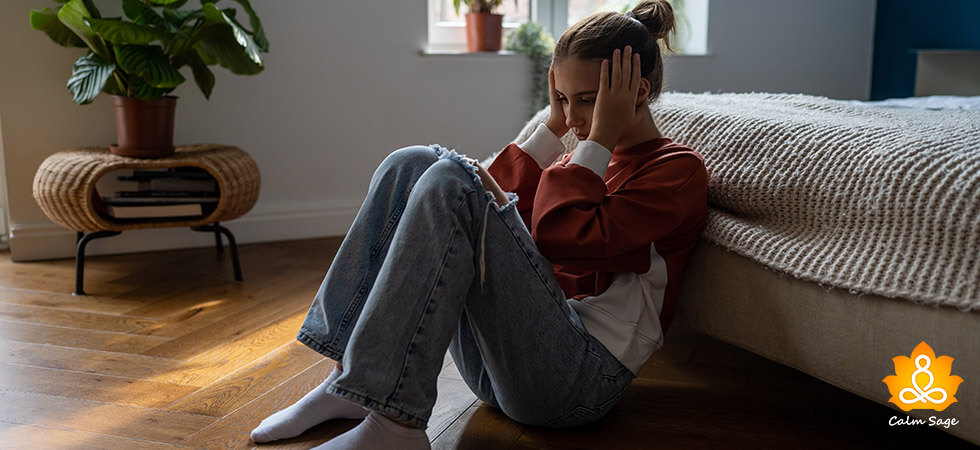Can Anxiety Cause Psychogenic Fever? Here’s What You Should Know

We know that anxiety and stress can not only impact our mental or emotional health but can also take a toll on our physical health, but can anxiety cause fever and chills? Well, interestingly, stress and anxiety can raise your body temperature, causing a physical sensation termed, “Psychogenic Fever” or “Emotional Fever”.
Psychogenic fever is a fever caused by psychological causes instead of biological or environmental ones. For some people, psychogenic fever can be mild and short-lived, while others may experience a sudden spike in body temperature that lasts a while.
How do anxiety and stress play a role in body temperature though? When your anxiety is triggered, your body’s natural response is to go into a flight-or-fight mode, bringing mental, emotional, behavioral, and physical changes such as;
- Rapid breathing
- Chest pain
- difficulty sleeping
- Dizziness
- Feeling hot or cold
- Nausea
- Trouble focusing
- Shaking and trembling
- Excessive sweating
- Muscle weakness, and
- Negative thoughts
These changes happen during an anxiety attack but can also act as warning signs of an oncoming anxiety attack. Let’s see how anxiety and stress affect body temperature and how you can get rid of psychogenic fever.
Can Anxiety Raise Body Temperature?
In simple terms, anxiety can raise body temperature but not always. When you experience excessive heat or chills during an anxiety attack, then this phenomenon is called psychogenic fever or emotional fever.
There is not much research on psychogenic fever and how it comes to be, however, one thing is clear; psychogenic fever isn’t an accepted condition among many healthcare providers and physicians.
Even though there are limited research studies, some reports, and reviews do suggest that acute anxiety and stress can cause symptoms of fever and raised body temperature. The average temperature of an adult body ranges between 35.6 °C and 36.7 °C. Even then, during the day, other factors such as hormones, weather patterns, and even your activity levels can fluctuate your average body temperature.
Chronic stress and continuous bouts of anxiety can increase the fluctuations and make them more frequent than normal. In a study, it was found that people who experienced anxiety-induced fever had a body temperature as high as 41 °C or 106 °F. The range of body temperature caused by psychogenic fever can be from 99 °F to 100 °F.
Psychogenic fever is your body’s response to highly emotional situations and can be treated the same way other flu and medical conditions can be; with medications. Keep in mind that only a healthcare professional can diagnose your condition and prescribe the right medications. Moreover, it’s always best to consult a professional if the cause of your fever is anxiety. They might also prescribe anti-anxiety medications to help you manage your symptoms.
What Happens Then?
Anxiety is your natural response when faced with a threat or danger. Anxiety can put your body into a fight-fight-freeze mode which can protect you from the threat. During this stress response, your body releases cortisol and adrenaline to prepare and protect.
When these hormones are released, it impacts the mind and body, triggering;
- An increase in heart rate
- An increase in blood pressure
- Rapid breathing
- Quick swallowing
During this, your blood vessels might constrict, resulting in a sudden rise in body temperature. You may either experience hot flashes or chills. To regulate your body temperature, you might start sweating heavily and may also begin breathing rapidly.
How To Reduce Psychogenic Fever?
The physical symptoms of anxiety and stress may go down naturally. You can use some home remedies too to reduce the hot flashes and chills. If you’re living with an anxiety disorder, then you may experience the symptoms of anxiety a lot.
You can discuss the best treatment with a professional, but if you need extra help, you can try these ways to reduce the physical symptoms of anxiety;
1.Prescribed Medications
If you have been diagnosed with an anxiety disorder and have sought treatment, then your doctor might have also prescribed some medications to help reduce the impact of anxiety. If not, you can try to reach out to a professional who can recommend medications.
Antianxiety medications can help you manage anxiety symptoms – mental, emotional, behavioral, and physical.
2.Relaxation Techniques
You can also give relaxation techniques a try. Techniques such as deep breathing, box breathing, and mindfulness meditation can all help you reduce negative thoughts and bring your awareness to the present moment.
If you’re struggling with sudden symptoms of anxiety, then try to take deep and deliberate breaths. Anxiety causes fast breathing and we need to slow that down to bring our body back to normal.
3.Get Moving
Even physical exercise can help you manage symptoms of anxiety. If you’re feeling anxious, take a short walk or sit quietly in a park, just breathing. If you find running or active exercise fun, then you can try that. Working out can release endorphins and dopamine that can help you feel good and calm.
If you’re living with an anxiety disorder or chronic stress, then you can try yoga or tai chi as regular exercises.
4.Seek Professional Support
Understanding the cause of your anxiety and chronic stress can also be a great way to learn how to manage the symptoms. A professional therapist can help you get to the root cause of your anxiety and give you solutions and coping strategies to reduce the symptoms and their impact.
Try to reach out to a therapist who has experience in treating anxiety. You can connect with a therapist by clicking the link below.
Wrap-Up
Stress and anxiety can not only take a toll on your mental or emotional health but can also affect your physical health. While it can be rare, anxiety and stress can be reasons you may develop a fever. This phenomenon is called psychogenic fever.
While more research is needed to truly understand how anxiety and stress can affect body temperature, some studies show that during highly emotional and stressful events, our bodies can develop fever-like symptoms. Although anxiety-induced fever or psychogenic fever don’t last long, they can raise body temperature to 106 °F.
If you’re constantly struggling with anxiety, then reaching out to a professional might help. You can also try the above-listed strategies to cope with the physical symptoms of anxiety.
I hope this article helped you understand how anxiety can raise body temperature and how to manage its symptoms. For more, you can write to us at info@calmsage.com or DM us on social media. You can also share your thoughts with us in the comments section below.
Take Care!




















